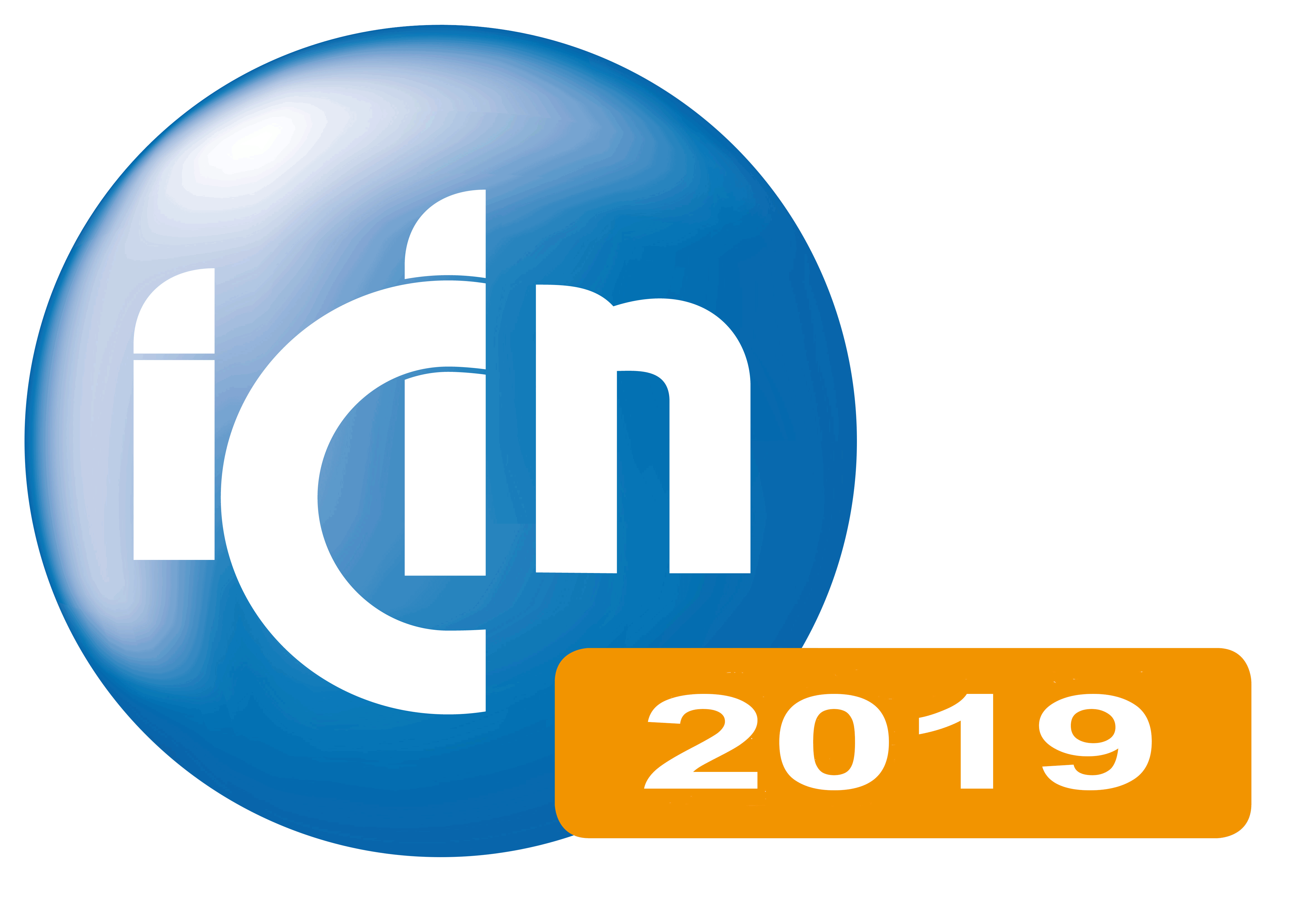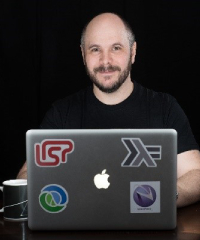
9:00 - 09:10 Welcome speech
9:10 - 09:50 Keynote
09:50 - 10:30 Video streaming - I - Chaired by: Lea Skorin-Kapov (University of Zagreb, Croatia)
10:30 - 11:00 Coffee Break
11:00 - 12:00 Video streaming - II - Chaired by: Alessandro Floris (University of Cagliari, Italy)
12:00 - 13:00 Machine learning based quality prediction - Chaired by: Tobais Hossfeld (University of Würzburg, Germany)
13:00 - 14:00 Lunch
14:00 - 14:40 Keynote
14:40 - 15:20 Resource allocation - Chaired by: Michael Seufert (AIT, Austria)
15:20 - 16:00 Coffee Break
16:00 - 17:00 Quality monitoring - Chaired by: Martin Varela (callstats.io, Finland)
17:00 - 17:05 Closing
QoE 2019 is a full-day conference, co-located with ICIN 2019. Check QoE 2019 for details.
Registration can be done solely to QoE 2019, but a reduced attractive rate is available for a full event including ICIN 2019.
We encourage QoE 2019 participants to register the full event.
| Registration by Jan 15, 2019 | |||
| QoE Author* | 360.00 € | ||
| Author Full Event^ | 708.00 € | ||
| Early Bird Registration by Jan 15, 2019 | Advance Registration by Feb 5, 2019 | Late Registration | |
| QoE Regular Rate° | 400.00 € | 440.00 € | 480.00 € |
| QoE Reduced Rate°° | 360.00 € | 400.00 € | 440.00 € |
| Full Event^ Regular Rate° | 768.00 € | 828.00 € | 948.00 € |
| Full Event^ Reduced Rate°° | 708.00 € | 768.00 € | 888.00 € |
| Student (Full Event) | 360.00 € | 420.00 € | 456.00 € |
| Extra gala dinner | 80.00 € | ||

Abstract: There is currently a non-trivial gap between research on QoE and QoE management, as conceived by the research community, and the actual practices in the industry. As a result, much of our ideas, while good on paper, don't get to be applied in the wild. There are numerous reasons for this, and in this talk, I will cover some of them, along with potential solutions. In particular, I will cover some issues I've observed in the context of WebRTC monitoring. The goal is to inspire QoE researchers — in particular those interested in QoE management — to try and shift their perspective, so that it is better aligned with the realities of the industry.
Biography: Martín Varela has over 16 years of QoE research background. He received his PhD from the Université de Rennes 1, France, in 2005, and has since worked both in academia (most recently in VTT, Finland, where he was a Principal Scientist, leading research on QoE), and nowadays in the industry, trying to figure out the intricacies of quality for WebRTC applications at callstats.io.

Abstract: The ecosystem of Internet and enterprise network applications has always been changing at a very fast pace: as applications are essentially pieces of software, this allow the fast introduction of new killer applications in the ecosystem, the extinction of others, and a continuous evolution of the remaining ones. As the ultimate goal of any application is to offer some kind of entertainment or a business service to its end users, the objective measurement of the quality of experience (QoE) delivered to the users has been a quite active research field. From the network viewpoint, an accurate measurement of the user QoE empowers the infrastructure with the ability to more effectively control the usage, and better arbitrate the sharing, of its available resources: going beyond QoS management, which can at most improve network efficiency, QoE management allows to improve the benefits perceived by its user.
While QoE-driven network management is a desirable objective, it also raises significant challenges. Clearly, QoE management can improve over classic QoS management only as long as the QoE inference process is accurate. However QoE inference is complex due to continuous protocol evolution, application changes and related trends such as traffic encryption, etc. As such, the use of techniques such as machine learning to let define data-driven QoE models is as appealing as it is challenging. One of these reasons lays in the fact that QoE estimation need to involves humans in the learning loop, to provides useful ``labels'' as input to the learning algorithm. The process to collect these labels is cumbersome, and exposed to a range of human behaviors -- that can seldom be described with adjectives as unexpected, random, funny, counter-intuitive, adversarial. Yet, humans are key in this QoE loop, of which they are both the starting point, as well as the ultimate goal.
In this keynotes, we discuss these challenges taking an ever-green Internet application (namely, Web browsing) as the main leitmotiv and to provide examples of practical relevance.
Biography: Dario Rossi is Chief Expert on Network AI at Huawei Technologies, co. Ltd. He holds an HDR from UPMC (2010), as well as a PhD (2005) and MSc (2001) degrees from Politecnico di Torino. Before joining Huawei in 2018, he occupied a Chair Professor (2016-2018), Full Professor (2012-2016) and Associate Professor (2006-2012) positions at the Computer Science and Networking department of Telecom ParisTech. He was also a Professor at the LIX department of Ecole Polytechnique (2012-2018). Prior to that, he worked with the Telecommunication Network Group of the Electrical Engineering department at Politecnico di Torino (2001-2006) and held a Visiting Researcher position in the Computer Science division at University of California, Berkeley (2003-2004). He co-chaired the RT2, that federates the Institut Mines-Telecom researchers working on the networking domain (about 50 people from 5 schools in France), presently serves in the Steering committees of ITC and AINTEC, chaired ACM ICN (2016), the last 2 editions of ACM SIGCOMM AINTEC (2013,2014) and of the ACM SIGCOMM PhD School on Traffic Monitoring and Analysis (2014,2018) and participated in the program committees of 50+ conferences including IEEE INFOCOM, ACM CoNEXT and ACM SIGCOMM. He has coauthored 8 patents and 150+ papers in leading conferences (including IEEE INFOCOM, ACM SIGCOMM, ACM CoNEXT, ACM IMC and WWW) and journals (including IEEE JSAC, ACM/IEEE TON, ACM CCR, IEEE TMM) that attracted over 5000 citations (Google scholar) and received 6 best paper awards. He is Senior Member of IEEE (2013) and ACM (2015), received an IETF Applied Network Research Prize (2016), a Google Faculty Research Award (2015), and has been honored with Distinguished Member recognition from the INFOCOM TPC (2015, 2016, 2017). His current research interest include Machine learning, Internet traffic measurement, and high speed all-sofware networking, whereas previous interests included congestion control, Information centric networks, green networking, peer-2-peer networks, traffic engineering and vehicular networks.
(Click here to download CFP in PDF format)
The 3rd International Workshop on Quality of Experience Management (QoE-Management) will be held in conjunction with the 22nd Conference on Innovation in Clouds, Internet and Networks (ICIN 2019) in Paris, France, from February 18-21, 2019. After the success of the previous QoE-Management workshops, also the third edition of the workshop is endorsed by the QoE and Networking Initiative (http://qoe.community).
Recent technological advances have enabled a constant proliferation of novel immersive and interactive services that pose ever-increasing demands to our communication ecosystem and offer a plethora of service consumption possibilities. Examples include: social TV, immersive environments, mobile gaming, Ultra High Definition (4K/8K), 3D virtual worlds, and Virtual and Augmented Reality. While service and application management has typically been centered around a set of Quality of Service parameters (e.g., packet loss, delay, jitter), there is a clear need to understand and model the impact of management decisions on Quality of Experience (QoE) metrics as perceived by the end user.
To date, a significant amount of research has been devoted to understanding, measuring, and modeling QoE for a variety of media services. The next step is to explore methods that actively exploit such knowledge to improve and manage the quality of multimedia services, while at the same time ensuring efficient and cost-effective network operations. Moreover, with many different players involved in the end-to-end service delivery chain, identifying the root causes of QoE impairments and finding effective solutions for meeting the end users' requirements and expectations in terms of service quality is a challenging and complex problem. Going beyond technical aspects of actually implementing QoE management schemes, there is a need to address the business and economic aspects which are critical for those schemes to become viable in practice.
QoE-Management 2019 aims at providing an international forum for researchers addressing emerging concepts and challenges related to managing QoE for networked services. The workshop will aim to address QoE management in the context of ongoing developments, such as the move to 5G and virtualized networks; the exploitation of big data analytics and machine learning in the domains of QoE modeling and monitoring; and solutions targeting emerging complex, interactive, and immersive service scenarios. The workshop will combine original full and short paper presentations with a motivating keynote to thoroughly explore this challenging topic.
Paper submissions must present original, research or experiences. Late-breaking advances and work-in-progress reports from ongoing research are also encouraged. Only original papers that have not been published or submitted for publication elsewhere can be submitted. Each submission must be written in English, accompanied by a 75 to 200 word abstract and a list of up to 5 key words. There is a length limitation of 6 A4 (210 mm x 297 mm) pages for full papers and 3 pages for short papers (including title, abstract, figures, tables, and references).
Submissions must be in 2-column IEEE conference style with a minimum font size of 10 pt. Papers exceeding these limits, multiple submissions, and self-plagiarized papers will be rejected without further review. Authors should submit their papers electronically via the EDAS online submission system: http://edas.info/N25394 .
Papers accepted for QoE-Management 2019 will be included in the conference proceedings and IEEE Xplore. The IEEE reserves the right to remove any paper from IEEE Xplore if the paper is not presented at the workshop.